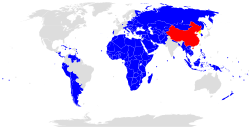References
- 1 2 3 "Introduction of the China-LAC Cooperation Fund". China-CELAC Forum.
- ↑ Li, Yuanbo; Zhu, Xuefeng (April 17, 2019). "The 2030 Agenda for Sustainable Development and China's Belt and Road Initiative in Latin America and the Caribbean" (PDF). Sustainability. 11 (8): 2297. doi: 10.3390/su11082297 . S2CID 159185022.
- ↑ Gallagher, Kevin (February 12, 2016). "China doubles bets on ailing Latin American economies". Financial Times.
- ↑ Myers, Margaret; Gallagher, Kevin P. (March 30, 2018). "Chinese development finance "down but not out" in Latin America". Global Americans.
